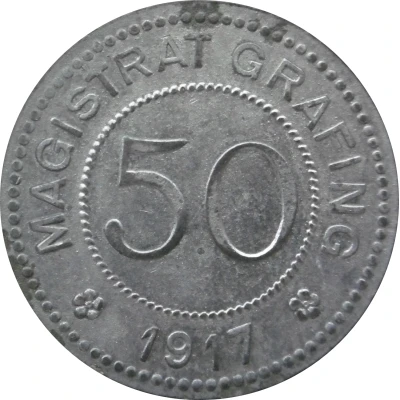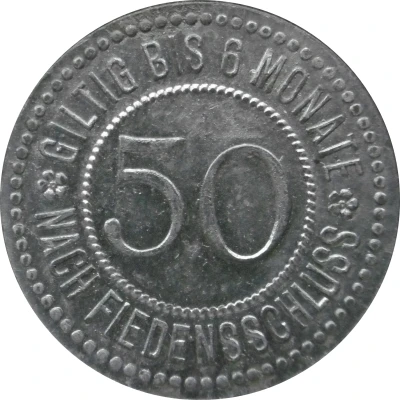


© Willem63 (CC BY-NC-SA)
50 Pfennigs - Grafing
1917 year| Zinc | 3.4 g | 25.5 mm |
| Issuer | Market Town of Grafing (Federal state of Bavaria) |
|---|---|
| Emperor | William II (Wilhelm II) (1888-1918) |
| Type | Standard circulation coin |
| Year | 1917 |
| Value | 50 Pfennigs (50 Pfennige) (0.50) |
| Currency | Mark (1914-1924) |
| Composition | Zinc |
| Weight | 3.4 g |
| Diameter | 25.5 mm |
| Thickness | 1.2 mm |
| Shape | Round |
| Technique | Milled |
| Orientation | Medal alignment ↑↑ |
| Demonetized | Yes |
| Updated | 2024-10-04 |
| Numista | N#297855 |
|---|---|
| Rarity index | 94% |
Reverse
Pearl rim, legend surrounding rope circle with denomination centered
Script: Latin
Lettering:
GILTIG BIS 6 MONATE
50
✿ NACH FIEDENSSCHLUSS ✿
Edge
Plain
Interesting fact
The 50 Pfennigs - Grafing 1917 coin was minted during a time of economic turmoil in Germany, known as the "Inflationary Period" (1914-1923). During this time, the value of the German mark (the national currency) plummeted, and prices for everyday goods skyrocketed. As a result, many Germans turned to alternative forms of currency, such as local Notgeld (emergency money) and foreign currencies. The 50 Pfennigs - Grafing 1917 coin, made of zinc and weighing 3.4 grams, was one of the few coins that remained in circulation during this time, and it became a symbol of stability and hope for the German people.